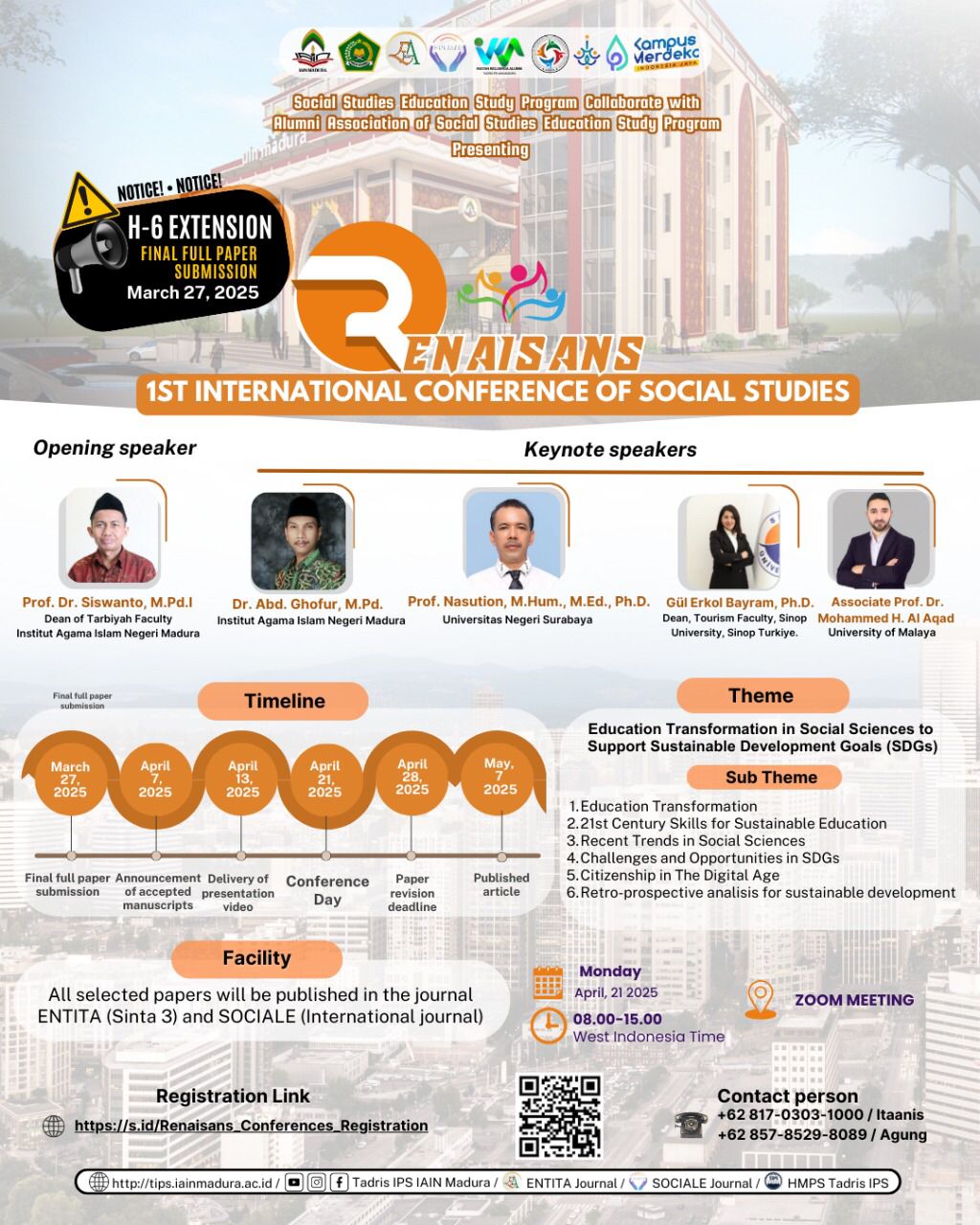Transformation of Artificial Intelligent-Based Education: Towards More Personalized and Effective Learning
 Abstract views: 3
,
Abstract views: 3
,
 PDF downloads: 4
PDF downloads: 4
Abstract
Artificial intelligence (AI)-based education transformation has become a global trend to enhance learning effectiveness. AI enables personalized learning by adapting materials, methods, and pace according to each student's needs. Technologies such as intelligent tutoring systems, learning analytics, and educational chatbots have been widely adopted to improve the learning experience. This study aims to analyze the role of AI in learning personalization and its effectiveness in improving student outcomes, while also examining the challenges and opportunities of its implementation. The research method is a systematic literature review of recent studies on AI in education, with data gathered from academic journals, research reports, and industry publications. The results show that AI increases student engagement and independence through adaptive feedback and educator support, and presents opportunities for AI-driven blended learning development. However, challenges such as limited access to technology, ethical and data privacy concerns, and educators’ readiness remain significant barriers. The study concludes that while AI holds great potential in education, its implementation must be accompanied by well-planned strategies and appropriate policy support to maximize its benefits.
Downloads
References
Aniston, A. (2024). Why Schools Must Act Now: The Urgent Need for AI Policies in Education. masterlylegal.com. Retrieved from March 22, 2025. https://www.masterlylegal.com/why-schools-must-act-now-the-urgent-need-for-ai-policies-in-education
Apriadi, R. T., & Sihotang, H. (2023). Transformasi Mendalam Pendidikan Melalui Kecerdasan Buatan: Dampak Positif bagi Siswa Dalam Era Digital. Jurnal Pendidikan Tambusai, 7(3), 31742–31748. https://doi.org/10.31004/jptam.v7i3.12182
Chassignol, M., Khoroshavin, A., Klimova, A., & Bilyatdinova, A. (2018). Artificial Intelligence Trends in Education: A Narrative Overview. Procedia Computer Science, 136, 16–24. https://doi.org/10.1016/j.procs.2018.08.233
Chen, L., Chen, P., & Lin, Z. (2020). Artificial Intelligence in Education: A Review. IEEE Access, 8(4), 75264–75278. https://doi.org/10.1109/ACCESS.2020.2988510
Darling-Hammond, L., Hyler, M. E., & Gardner, M. (2017). Effective teacher professional development. Learning Policy Institute.
Digital Defynd. (2025). Use of AI in Schools [25 Case Studies] [2025]. digitaldefynd.com. Retrieved from March 22, 2025. https://digitaldefynd.com/IQ/ai-in-schools-case-studies/
Holmes, W., Bialik, M., & Fadel, C. (2019). Artificial Intelligence in Education. Promise and Implications for Teaching and Learning. Boston, Massachusetts: Center for Curriculum Redesign.
Hwang, G. J., Xie, H., Wah, B. W., & Gašević, D. (2020). Vision, Challenges, Roles and Research Issues of Artificial Intelligence in Education. Computers and Education: Artificial Intelligence, 1(9), 1–5. https://doi.org/10.1016/j.caeai.2020.100001
Inspiroz. (2023). The Ethical Implications of AI in Education. inspiroz.com. Retrieved from March 22, 2025. https://inspiroz.com/the-ethical-implications-of-ai-in-education/
Jie, A. L. X., & Kamrozzaman, N. A. (2024). The Challenges of Higher Education Students Face in Using Artificial Intelligence (AI) Against Their Learning Experiences. Open Journal of Social Sciences, 12(10), 362–387. https://doi.org/10.4236/jss.2024.1210025
Karyadi, B. (2023). Pemanfaatan Kecerdasan Buatan Dalam Mendukung Pembelajaran Mandiri. Educate: Jurnal Teknologi Pendidikan, 8(2), 253–258. https://doi.org/10.32832/educate.v8i02.14843
Kooli, C., & Yusuf, N. (2025). Transforming Educational Assessment: Insights Into the Use of ChatGPT and Large Language Models in Grading. International Journal of Human–Computer Interaction, 41(5), 3388–3399. https://doi.org/10.1080/10447318.2024.2338330
Liao, S. M. (2020). Ethics of Artificial Intelligence. Oxford: Oxford University Press.
Luckin, R., & Holmes, W. (2016). Intelligence Unleashed: An Argument for AI in Education UCL Knowledge Lab. London: University College.
Mataer Digital. (2023). Kecerdasan Buatan (AI) Bagi Perguruan Tinggi Menuju Transformasi Digital. mataerdigital.com. Retrieved from March 22, 2025. https://mataerdigital.com/2023/08/16/kecerdasan-buatan-ai-bagi-perguruan-tinggi-menuju-transformasi-digital/
Oktavia, D. H., & Suseno, G. (2024). Pemanfaatan Kecerdasan Buatan dalam Pendidikan di Indonesia: Potensi dan Tantangan. Indo-MathEdu Intellectuals Journal, 5(2), 1680–1686. https://doi.org/10.54373/imeij.v5i2.876
Pedro, F., Subosa, M., Rivas, A., & Valverde, P. (2023). Artificial Intelligence in Education: Challenges and Opportunities for Sustainable Development. France: United Nations Educational, Scientific and Cultural Organization.
Rochmawati, D. R., Arya, I., & Zakariyya, A. (2023). Manfaat Kecerdasan Buatan Untuk Pendidikan. Jurnal Teknologi Komputer Dan Informatika, 2(1), 124–134. https://doi.org/10.59820/tekomin.v2i1.163
Surya, R. A. (2024). Implementation of Artificial Intelligence in Personalized Learning Systems. Journal of Vocational Education and Educational Technology Innovations, 1(2), 41–48.
Tang, L., & Su, Y. S. (2024). Ethical Implications and Principles of Using Artificial Intelligence Models in the Classroom: A Systematic Literature Review. International Journal of Interactive Multimedia and Artificial Intelligence, 8(5), 25–36. https://doi.org/10.9781/ijimai.2024.02.010
UNESCO. (2021). AI and education: Guidance for policy-makers. UNESCO Publishing.
Winarsih, N., & Salsabila, S. (2022). The Phenomenon of Internet Addiction Disorder Online Gambling In Probolinggo. Entita: Jurnal Pendidikan Ilmu Pengetahuan Sosial Dan Ilmu-Ilmu Sosial, 4(2), 183–196. https://doi.org/10.19105/ejpis.v4i2.6782
Zahrawati, F., & Aras, A. (2022). Cyber Teaching dan Ancaman Alienasi: Potret Kecil Keterasingan Mahasiswa di Tengah Pandemi Covid-19. Entita: Jurnal Pendidikan Ilmu Pengetahuan Sosial Dan Ilmu-Ilmu Sosial, 4(2), 197–210. https://doi.org/10.19105/ejpis.v4i2.6913
Copyright (c) 2025 Entita: Jurnal Pendidikan Ilmu Pengetahuan Sosial dan Ilmu-Ilmu Sosial

This work is licensed under a Creative Commons Attribution-NonCommercial 4.0 International License.
ENTITA: Jurnal Pendidikan Ilmu Pengetahuan Sosial dan Ilmu-Ilmu Sosial operates an Open Access policy under a Creative Commons Non-Commercial 4.0 International license. Authors who publish with this journal agree to the following terms:
- The copyright of the received article once accepted for publication shall be assigned to the journal as the publisher with licensed under a

- Journal is able to enter into separate, additional contractual arrangements for the non-exclusive distribution of the journal's published version of the work (e.g., post it to an institutional repository or publish it in a book), with an acknowledgement of its initial publication in this journal.
- Journal is permitted and encouraged to post their work online (e.g., in institutional repositories or on their website) prior to and during the submission process, as it can lead to productive exchanges, as well as earlier and greater citation of published work (see The Effect of Open Access).
- Here is Copyright Transfer Form that author can download and send to OJS during submission.

















